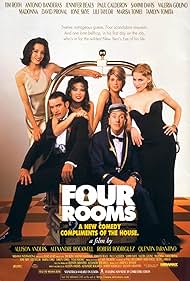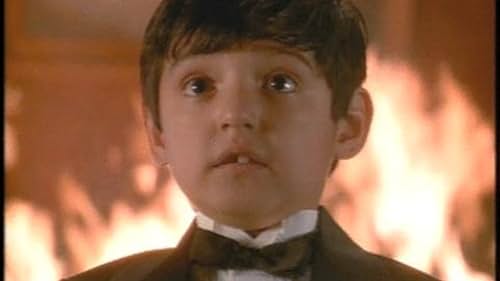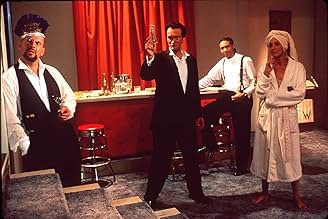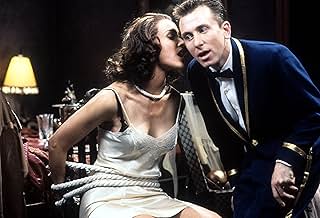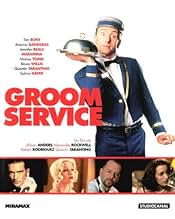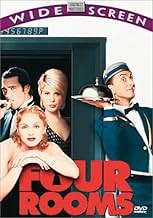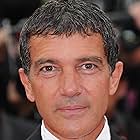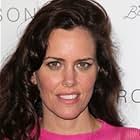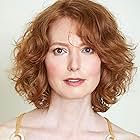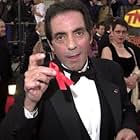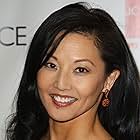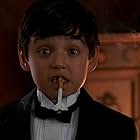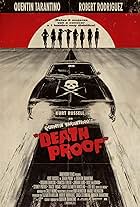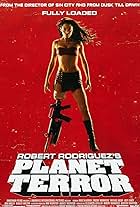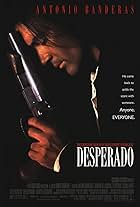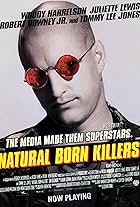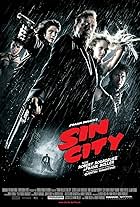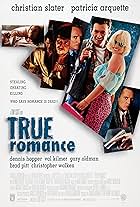Four interlocking tales that take place in a fading hotel on New Year's Eve.Four interlocking tales that take place in a fading hotel on New Year's Eve.Four interlocking tales that take place in a fading hotel on New Year's Eve.
- Awards
- 1 win & 1 nomination
Amanda De Cadenet
- Diana (segment "The Missing Ingredient")
- (as Amanda deCadenet)
Patricia Vonne
- Corpse (segment "The Misbehavers")
- (as Patricia Vonne Rodriguez)
Storyline
Did you know
- TriviaThe reason Bruce Willis is not credited is because he violated SAG rules for acting in this film for no money. He appeared for fun and as a favor to Quentin Tarantino, and acting for free violated SAG rules. SAG agreed not to sue Willis if his name was not included in the credits.
- GoofsThe hotel's vintage telephone switchboard adds an element of comic chaos, but it is not consistently used. Ted answers calls to the front desk by pushing cables into jacks, but Sarah (the little girl in "The Misbehavers") is able to dial another room directly. Also, when the partying guys call and don't know what room they are in, Ted should be able to get the room number right off the switchboard which means that Ted had no excuse to deliver the ice to the wrong room. Also near the end of the scene, Ted is shouting into the phone to send the police but this would be impossible because there was no-one on the switchboard to connect him to an external line.
- Quotes
Angela: Whether you like it or not, you are in the middle of a situation here you cannot just wish your way out of.
Ted the Bellhop: But I've never met you people before! You're complete strangers!
Angela: Everybody starts out as strangers, Ted. It's where we end up that counts.
- Crazy creditsBruce Willis does not apear in the credits but his hairstylist does
- Alternate versionsAs indicated in the Technical Specifications link for this page on IMDB, there are two different versions of this film: "1 hr 38 min (98 min)" and "1 hr 50 min (110 min) (workprint)". Information on the workprint is as follows: "[The] second version is in English but it is overdubbed with Russian. This makes it almost impossible to work out what is extra as the Russian is much louder than the English and therefore the English cannot be heard for the majority of the movie. I have done some research and have been told that it is impossible to remove the Russian audio. The disc also contains a deleted scene from the Spanish DVD that is an alternate take, not used in either the DVD Version or the Workprint."
- ConnectionsFeatured in Cinemania: Ypalliloi en drasei! (2009)
- SoundtracksSentimental Journey
Written by Bud Green, Les Brown, Ben Homer
Performed by Juan García Esquivel (as Esquivel)
Courtesy of The RCA Records label of BMG Music
Featured review
It's impossible to analyze this film without breaking it down into its four segments for separate comment. It would also be improper, since it was not intended to be anything less than an anthology from four notable independent filmmakers: Alexandre Rockwell, Alison Anders, Robert Rodriguez, and Quentin Tarantino.
The first episode is exactly the sort of thing that someone in a high school drama production would want to do, but can't get away with in a high school drama production. It's juvenile, unfunny, and lifeless, but it has the (pointless) nudity and lines of dialogue like:
Witch #1: "I am your mother."
Witch #2: "Then why are we sleeping together?"
that sound like the screenwriter is giggling and thinking, "I can't believe I'm getting away with this! I'm so clever!"
Nothing is at stake in the first episode; it's generally expected that a story must have conflict in order to BE a story. This has none. Just some half-baked jokes and a pair of topless women (If I wanted that, I'd skip renting a movie and go out instead.)
Second episode is a hair better, but you'll find yourself crying "Why doesn't Ted the Bellboy do [insert plot resolution here] and get the bloody hell out of there!" When it finally does end, you're disheartened to find that it had no reason to exist. Two snips with a pair of scissors, a bit of tape, and we wouldn't know the difference. Roll opening credits, go straight to the Rodriguez segment.
Third episode has some structural support to keep it from caving in on itself. The surprise in the middle (I won't give it away, don't worry) is horrifying enough to give the segment some heft. Rodriguez and his d.p., Guillermo Navarro, move it along dexterously and (as usual) have a good handle on visual comedy.
The last segment is the best. I think it's safe to say that Quentin Tarantino has, officially, never disappointed me as a director or screenwriter. My heart leapt as soon as I heard his trademark dialogue coming from the lips of Marisa Tomei as "Four Rooms" segued from "The Misbehavers" to "The Man From Hollywood." I wasn't sure if his take on Ted the Bellhop's misadventures was going to be any good, but I knew that if he wrote it and helmed it, it wasn't going to be all bad.
What a pleasant surprise (still just talking about the fourth segment here). This part of the movie, with its ridiculous premise (lifted form an old Hitchcock episode, which it acknowledges out loud), moves along speedily, and the actors take to it as naturally as any other movies by Q.T. Basically playing himself, Tarantino is hilarious. If anything, he knows A) how people really act when they're drunk (i.e. not like Dudley Moore caricatures) B) why people think he's so obnoxious, like a real-life, fast-talking Jar Jar Binks and C) how to put some bang in his visual storytelling. It's low-rent Tarantino, don't get me wrong, but it's also the best part of "Four Rooms."
All in all, the first film I've ever seen that starts out with a loathsome, horrifying badness, gets incrementally better with each passing fifteen minutes, and ends as good as one would like. Just don't make me watch it again.
The first episode is exactly the sort of thing that someone in a high school drama production would want to do, but can't get away with in a high school drama production. It's juvenile, unfunny, and lifeless, but it has the (pointless) nudity and lines of dialogue like:
Witch #1: "I am your mother."
Witch #2: "Then why are we sleeping together?"
that sound like the screenwriter is giggling and thinking, "I can't believe I'm getting away with this! I'm so clever!"
Nothing is at stake in the first episode; it's generally expected that a story must have conflict in order to BE a story. This has none. Just some half-baked jokes and a pair of topless women (If I wanted that, I'd skip renting a movie and go out instead.)
Second episode is a hair better, but you'll find yourself crying "Why doesn't Ted the Bellboy do [insert plot resolution here] and get the bloody hell out of there!" When it finally does end, you're disheartened to find that it had no reason to exist. Two snips with a pair of scissors, a bit of tape, and we wouldn't know the difference. Roll opening credits, go straight to the Rodriguez segment.
Third episode has some structural support to keep it from caving in on itself. The surprise in the middle (I won't give it away, don't worry) is horrifying enough to give the segment some heft. Rodriguez and his d.p., Guillermo Navarro, move it along dexterously and (as usual) have a good handle on visual comedy.
The last segment is the best. I think it's safe to say that Quentin Tarantino has, officially, never disappointed me as a director or screenwriter. My heart leapt as soon as I heard his trademark dialogue coming from the lips of Marisa Tomei as "Four Rooms" segued from "The Misbehavers" to "The Man From Hollywood." I wasn't sure if his take on Ted the Bellhop's misadventures was going to be any good, but I knew that if he wrote it and helmed it, it wasn't going to be all bad.
What a pleasant surprise (still just talking about the fourth segment here). This part of the movie, with its ridiculous premise (lifted form an old Hitchcock episode, which it acknowledges out loud), moves along speedily, and the actors take to it as naturally as any other movies by Q.T. Basically playing himself, Tarantino is hilarious. If anything, he knows A) how people really act when they're drunk (i.e. not like Dudley Moore caricatures) B) why people think he's so obnoxious, like a real-life, fast-talking Jar Jar Binks and C) how to put some bang in his visual storytelling. It's low-rent Tarantino, don't get me wrong, but it's also the best part of "Four Rooms."
All in all, the first film I've ever seen that starts out with a loathsome, horrifying badness, gets incrementally better with each passing fifteen minutes, and ends as good as one would like. Just don't make me watch it again.
- Jaime N. Christley
- Jul 10, 1999
- Permalink
Details
- Release date
- Country of origin
- Official site
- Language
- Also known as
- Four Rooms and a Hotel
- Filming locations
- Production companies
- See more company credits at IMDbPro
Box office
- Budget
- $4,000,000 (estimated)
- Gross US & Canada
- $4,257,354
- Opening weekend US & Canada
- $427,733
- Dec 25, 1995
- Gross worldwide
- $4,257,354
Contribute to this page
Suggest an edit or add missing content

